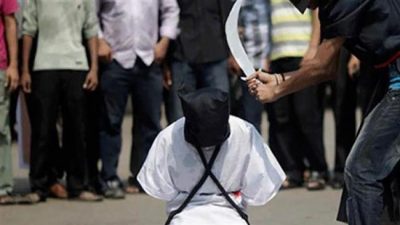Saudi Arabia’s Human Rights Record, Raises Number of Beheadings by 70%, Lack of Basic Freedoms for Women and Girls
The number of beheadings in Saudi Arabia during the first quarter of 2018 rose by over 70 percent in comparison with the corresponding period last year, a new report by a nonprofit organization says.

Featured image: Protesters of the beheading of foreign workers in Saudi Arabia stage a mock beheading. (File photo)
In its latest report published Saturday, the European-Saudi Organization for Human Rights (ESOHR) said executions by the Saudi government in the first quarter of 2018 increased by 72 percent.
The report also showed that a number of foreign nationals also face capital punishment in Saudi Arabia.
ESOHR released its report amid widespread criticism of Saudi Arabia over its terrible human rights record, including the censorship of free speech, indiscriminate incarceration of citizens with no due process, and lack of basic freedoms for women and girls.
The Saudi government refrains from providing any official statistics for people on death row but the organization confirmed that 42 people are expected to be imminently executed, including 8 individuals who were minors at the time of the offense.
The anti-death penalty rights group Reprieve said in March that Saudi Arabia’s execution rate has increased since Mohammed bin Salman was appointed crown prince in 2017. The group said 133 executions have taken place in the eight months since his appointment last June, compared with 67 in the eight months before.
Maya Foa, the group’s director, said,
“The doubling of executions under the new crown prince reveals that, beneath his glossy public image, Mohammed bin Salman is one of the most brutal leaders in the kingdom’s recent history.”
In its report, ESOHR denounced the Saudi regime’s execution of people for alleged offenses that are not even against the international law and said the convicts have simply attended peaceful demonstrations, exercised freedom of speech or practiced their religious rites.
The Riyadh regime has been rejecting all requests for visits by special independent rapporteurs of the United Nations since 2008, the report added.
Concern is growing about the increasing number of executions in Saudi Arabia. Saudi authorities say the executions reveal the Saudi government’s commitment to “maintaining security and realizing justice.” The country has come under particular criticism from rights groups for the executions carried out for non-fatal crimes.
According to the London-based rights group Amnesty International, Saudi Arabia has one of the highest execution rates in the world. The New York-based Human Rights Watch (HRW) has called on the Saudi regime to abolish its “ghastly” beheadings.
In the most stunning case of executions in 2016, Saudi Arabia executed on January 2 Sheikh Nimr al-Nimr along 46 other people in defiance of international calls for the release of the prominent Shia cleric and other jailed political dissidents in the kingdom.
In July 2017, human rights group Amnesty International called on Saudi Arabia to halt the executions of 14 individuals who were sentenced to death following a “grossly unfair mass trial” as part of the kingdom’s “bloody execution spree.”
“By confirming these sentences Saudi Arabia’s authorities have displayed their ruthless commitment to the use of the death penalty as a weapon to crush dissent and neutralize political opponents,” said Amnesty’s director of campaigns for the Middle-East, Samah Hadid.
The 14 individuals were convicted over charges of “armed rebellion against the ruler” by, among other things, “participating in shooting at security personnel, security vehicles,” “preparing and using Molotov Cocktail bombs,” “theft and armed robbery” and “inciting chaos, organizing and participating in riots.”


